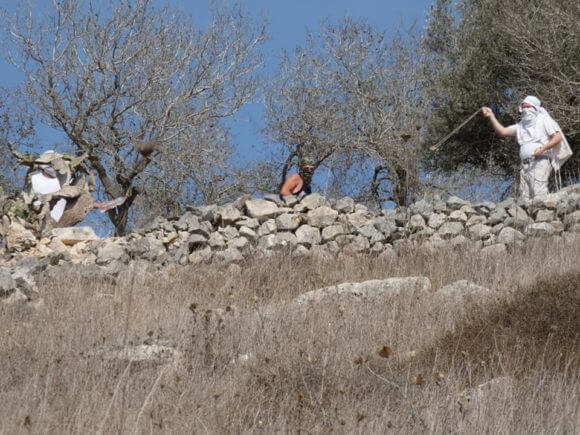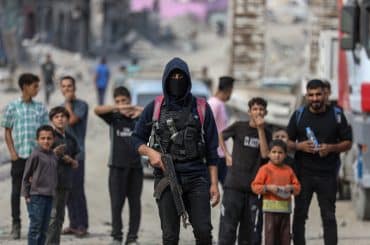Every year, without fail, Palestinians mark the beginning of autumn with the olive harvest. A sacred cultural event, families from across the country leave their towns and cities and head for their olive groves, passed down to them from the generations before.
And every year, without fail, much of the harvest is characterized by attacks on Palestinian farmers and families by Israeli settlers and armed soldiers. This year is no different.
Since the harvest began in early October, several incidents of settler attacks on farmers and their crops have been reported by activists and organizations in the occupied West Bank.
The UN Office for the Coordination of Humanitarian Affairs (OCHA) reported more than 10 settler attacks directly related to the olive harvest in the first two weeks of the month.
According to the agency, settlers physically assaulted and injured three Palestinian farmers in the Nablus area villages of Tell and Jit and the Bethlehem-area village of al-Jab’a.
More than 100 olive trees were set on fire and more than seven incidents of produce theft were reported in the villages of Burin (Nablus) and Kifr al-Dik (Salfit).
Other incidents of chopping down and uprooting dozens of trees were also reported by local news outlets.
On October 14th, Wafa news agency reported that a group of armed settlers attacked Palestinian farmers while they were harvesting their olives in the Tulkarem area of the northern West Bank “and threatened to shoot them if they do not leave their land.”
Just days later, on October 16th, another incident made headlines when a group of masked settler youth armed with crowbars attacked an Israeli Rabbi and the group of Palestinian farmers and international volunteers he was with.
The incident took place in the village of Burin — a hotspot for settler attacks given its proximity to notoriously violent settlements like Yitzhar and Har Brakha.
According to the Times of Israel, a group of some 10 international volunteers were escorting a group of farmers from Burin and the neighboring village of Huwwara when around 30 masked settlers from Yitzhar descended upon them.
Rabbi Moshe Yehudai from the group Rabbis for Human Rights was one of five people from the group who were injured, suffering blows to the head and arm.
Hilltop youth settlers attacked Palestinians, members of ATL, and @rhreng today during the olive harvest. Palestinians with olive groves and other lands in Area C face threats of settler and military violence, but the olive harvest is still ongoing. Photos by @LexieB2 pic.twitter.com/fZJWp59tDq
— All That's Left: Anti-Occupation Collective (@ATLCol) October 16, 2019
In yet another incident in Burin on October 19th, settlers from the Givat Ronen outpost were recorded hurling rocks at Palestinian farmers. Three farmers were reportedly hospitalized after being beaten and clubbed by the settlers.
On the same day, Israeli forces temporarily detained a group of Palestinian activists and farmers in the village while they were picking olives.
Ghassan Najjar, a local activist from Burin and one of those pictured above, posted a photo on Facebook of Burin’s olive trees that were set aflame by settlers, saying “I can’t find the words to describe the state of oppression that we are in every day.”
“But be sure, we come to our land to pick our olives to send a message to all the settler gangs, that we are greater than all of them,” Najjar wrote. “We will make sure that we will grow every inch of our land, and that burning and cutting our trees will not prevent our right to farm and access our land.”
With more than 12 million olive trees planted across 45% of the West Bank’s agricultural land, the olive harvest constitutes one of the biggest sources of economic sustainability for thousands of Palestinian families.
According to UN OCHA, the olive oil industry supports the livelihoods of more than 100,000 families and accounts for a quarter of the gross agricultural income of the occupied territories.
But, as local NGO MIFTAH notes, “olive trees carry more than an economic significance in the lives of Palestinians. They are not just like any other trees, they are symbolic of Palestinians’ attachment to their land.”
“Because the trees are drought-resistant and grow under poor soil conditions, they represent Palestinian resistance and resilience. The fact that olive trees live and bear fruit for thousands of years is parallel to Palestinian history and continuity on the land.”



Regarding the olive harvest, etc.
An Open Letter to the Consul General of the United Kingdom
from Palestinian, Samia Khoury, matriarch of Jerusalem’s renowned Khoury family.
“The following Headline appeared in Al-Quds, our local Arabic newspaper, on Friday, October 18. 2019: ‘Britain joins the Palestinians in the olive picking season.’
“It is quoting the Consul General of the United Kingdom in Jerusalem Mr. Philip Hall, that for the sixth consecutive year the UK has been supporting the Palestinians during the olive picking season. It is an opportunity for the staff of the consulate and other international volunteers to take part in this activity which is very vital for the Palestinian economy, over and above its cultural and social significance. He further emphasized the violence of the settlers in this season, and that fifteen diplomats from the Consulate and other international representatives were able to help the farmers in the Makhrour Valley where a Palestinian restaurant was recently demolished so that the settlers could start another building there.
“He further referred to the increasing violence of the settlers and that this activity is considered part of the humanitarian, and political support to the Palestinian towns, especially the marginalized ones in Area C.
“I could not help but respond to the item by writing back to the paper an open letter to the Consul General which I will translate in the following lines:
“‘I am sure the farmers and the owners of those olive trees are very grateful to the Consul General of the UK for this support, especially that the olive picking season has become a nightmare for the Palestinians due to the raids of the Jewish settlers with the support of the Israeli army.
“‘As we express our gratitude to the representative of the government of the United Kingdom for this initiative, I would like to draw his attention and the attention of the government of the United Kingdom, that the Palestinians expect much more from the United Kingdom than its support of the olive picking season.
“To start with, an apology for the infamous Balfour Declaration which facilitated the road for the Palestinian Nakba. Furthermore for the withdrawal of the British Mandate on May 15, 1948 without taking responsibility for the consequences of this withdrawal, over and above the consequences of the partition of Palestine.
“After seventy one years of the Palestinian dispossession and fifty two years of a brutal Israeli military occupation of the remaining Palestinian territories, don’t you think it is high time for the government of the United Kingdom to take a Moral Stand and recognize a Free Palestinian State that has a right to self- determination?”
Zionism and the “Jewish State” of Israel empower supremacist, colonialist goons – while the “most moral army” aids and abets them – to commit “necessary evil” in not-Israel.
Zionists are truly hateful and immoral people.
And once again…Nazi tactics taking place. For shame, israel…for shame.
Hi – Does anyone know of a site or resource that keeps track of olive trees destroyed or damaged? I would like to make a poster or board for my faith community to see the ongoing tree count. Robert henspert at yahoo is email.
A problem with people of literal faith: If what the Torah/Old Testament says about the Amalekites, Phillistines, etc. is true, then the settlers have a God-given entitlement that must be enforced. The Babylonian Talmud further enforces the sub-human status of the indigenous Palestinians. No surprise that certain Christians affirm the precept of Jewish entitlement – but then, the Jews are to be sorted out, bye-and-bye.
We may recognize here an ancient prototype of other, various, supremacist movements in History.